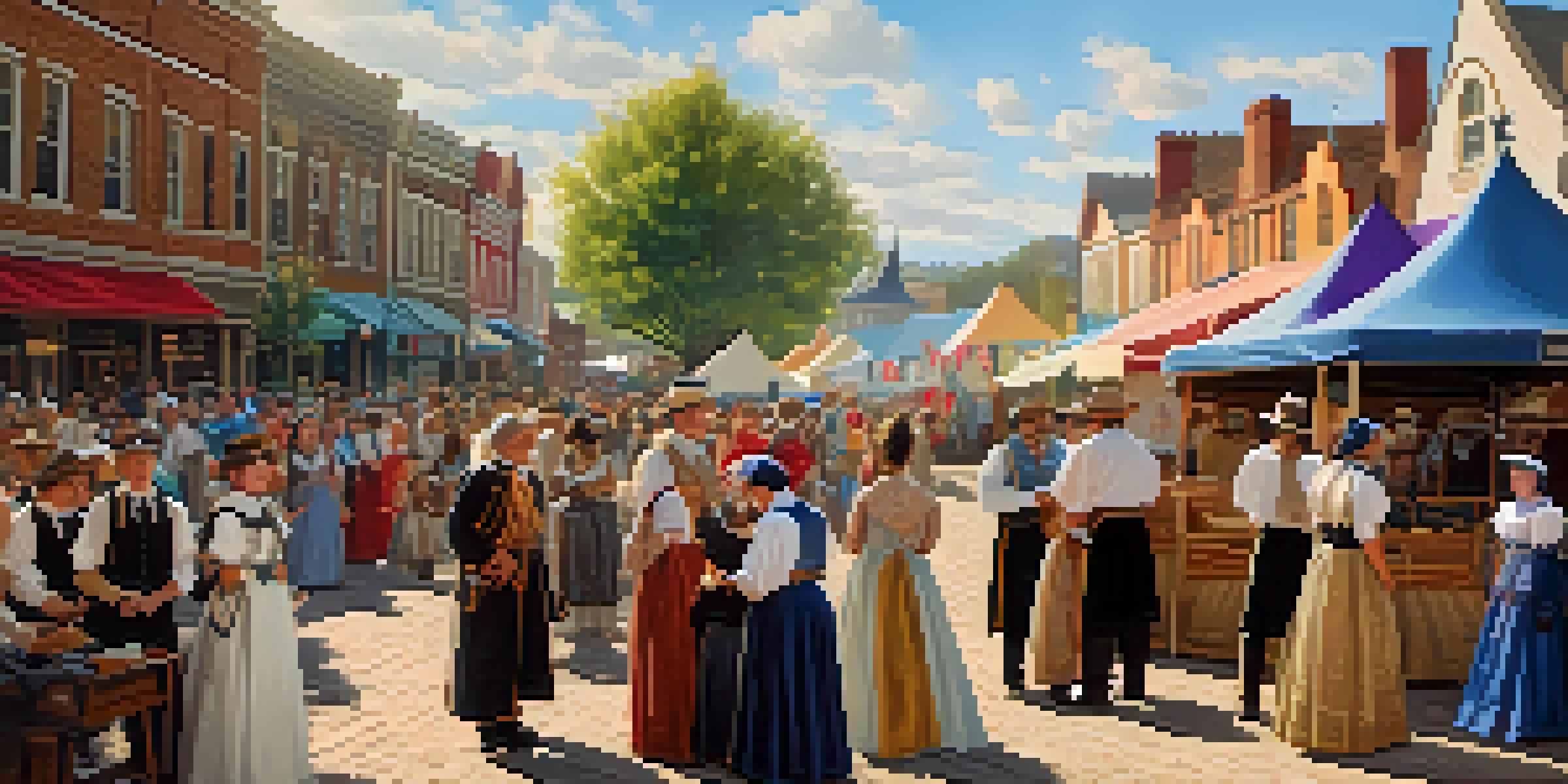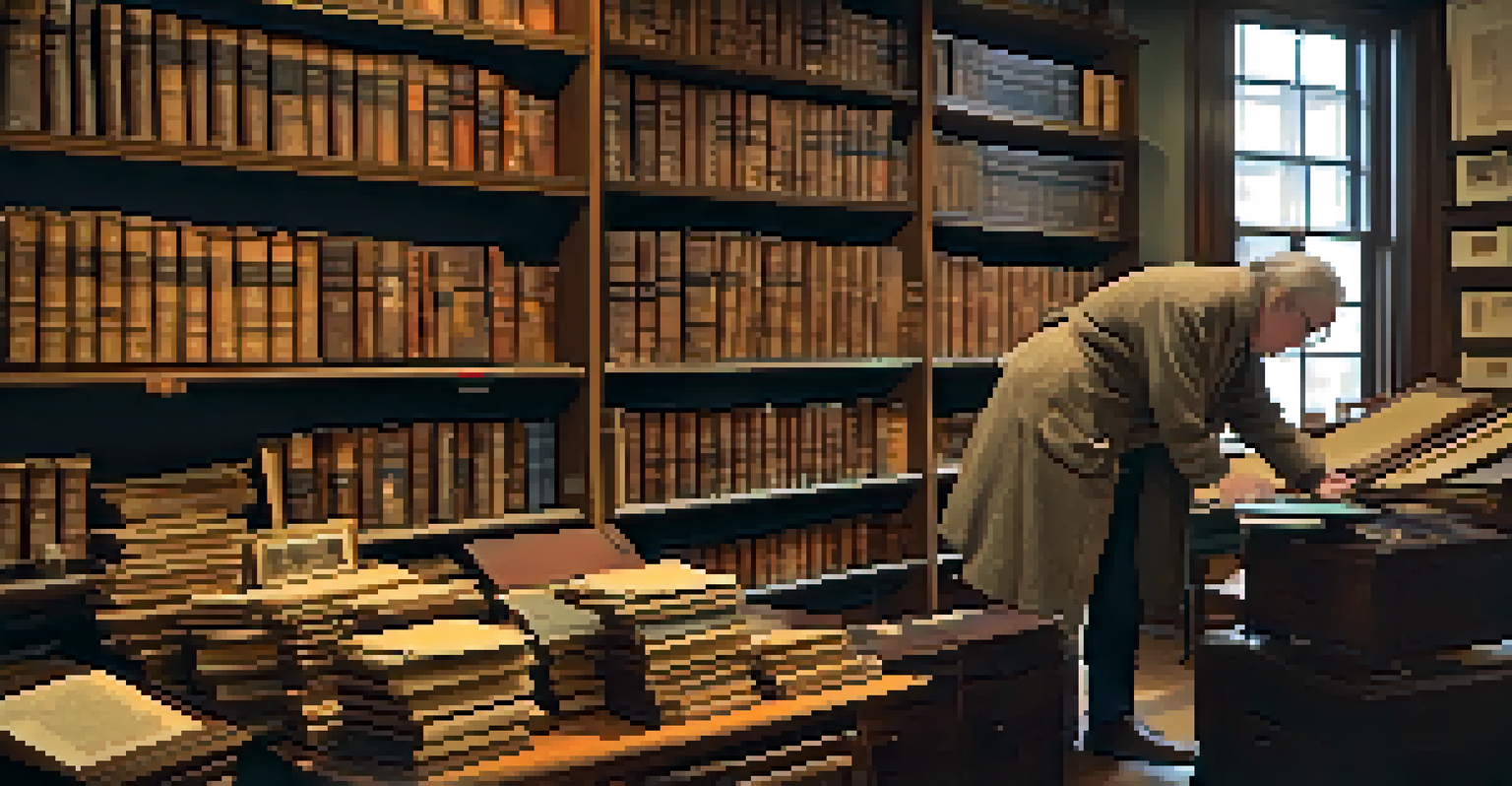Exploring the Role of Local Historical Societies in Preservation

Understanding Local Historical Societies and Their Purpose
Local historical societies serve as guardians of community heritage, preserving the stories and artifacts that define a place. These organizations often focus on collecting, documenting, and sharing local history, making it accessible to residents and visitors alike. They help foster a sense of identity and belonging by connecting people to their past.
History is not a burden on the memory but an illumination of the soul.
Typically composed of volunteers who are passionate about history, these societies engage in various activities, such as organizing events, conducting research, and maintaining archives. Their efforts ensure that the unique narratives of their communities are not lost to time. By highlighting local history, these societies enrich the cultural fabric of their areas.
Moreover, they often collaborate with schools and local governments to promote historical education. This partnership not only helps in preserving history but also instills pride in younger generations. As custodians of the past, local historical societies play a crucial role in shaping the future.
The Impact of Local Historical Societies on Preservation Efforts
Local historical societies are pivotal in preservation efforts, often leading initiatives to protect significant buildings and sites. They advocate for the conservation of historical landmarks, ensuring that these structures remain a part of the community landscape. This advocacy often involves raising awareness about the importance of these sites to local identity.

In addition to advocacy, these societies frequently conduct preservation workshops and provide resources for property owners looking to maintain historic homes. By offering guidance on best practices and available funding, they empower individuals to take action in preserving their heritage. This grassroots approach often leads to a more engaged community.
Preserving Community Heritage
Local historical societies play a crucial role in safeguarding and sharing the unique stories and artifacts that define their communities.
Their efforts can also attract tourism, as visitors seek out places rich in history. This influx can benefit local economies while fostering a deeper appreciation for the community’s heritage. Thus, the role of local historical societies extends beyond mere preservation; it positively influences the overall vitality of the community.
Challenges Faced by Local Historical Societies
Despite their significant contributions, local historical societies often face numerous challenges. Funding can be a major hurdle, as many rely on donations and grants that can fluctuate. This financial uncertainty can limit their ability to undertake larger preservation projects or maintain their facilities effectively.
Preservation of one's own culture does not require contempt or disrespect for other cultures.
Additionally, attracting new members can be difficult, particularly among younger generations who may be less aware of the importance of local history. Societies must find innovative ways to engage younger community members and demonstrate the relevance of history in today’s world. This could involve leveraging social media or hosting interactive events.
Moreover, the preservation landscape is always changing, with new technologies and methodologies emerging. Societies must adapt to these changes, balancing traditional preservation techniques with modern practices. This adaptability is essential for their survival and effectiveness in the long run.
Engaging the Community Through Events and Programs
One of the most effective ways local historical societies engage their communities is through events and programs. These activities can range from historical reenactments and guided tours to lectures and workshops, all designed to bring history to life. By offering diverse programming, societies cater to various interests and age groups.
Such events not only educate but also foster a sense of community. When residents come together to celebrate or learn about their shared history, it strengthens bonds and encourages collaboration. This sense of belonging can be particularly impactful in smaller towns, where community identity is closely tied to local history.
Engaging Communities Through Events
By organizing diverse events and programs, these societies foster community bonds and enhance appreciation for local history.
Moreover, these events often encourage participation from local businesses and organizations, creating a collaborative atmosphere. Partnerships can lead to sponsorships and increased visibility, benefiting both the society and the local economy. Ultimately, engaging the community through events is a win-win situation.
The Role of Technology in Historical Preservation
In the digital age, technology plays a transformative role in historical preservation. Local historical societies are increasingly utilizing digital platforms to archive documents, photographs, and artifacts. This not only protects these items from physical deterioration but also makes them accessible to a wider audience.
Social media offers societies a way to engage with the community, share stories, and promote events. By showcasing local history online, they can reach younger audiences and encourage involvement. This digital presence helps bridge the gap between traditional historical practices and modern engagement strategies.
Additionally, technology facilitates collaboration among societies. Online databases and shared resources allow for the pooling of knowledge and expertise, enhancing preservation efforts across regions. Embracing technology is essential for local historical societies to remain relevant and effective.
Success Stories: Local Historical Societies Making a Difference
Many local historical societies have successfully made a significant impact on their communities. For example, the Historical Society of Pennsylvania has played a crucial role in preserving vital records and documents that tell the story of the state. Their efforts have not only safeguarded history but also provided valuable resources for researchers and historians.
Another inspiring example is the Montpelier Foundation, which restored James Madison's estate in Virginia. Their work has transformed the site into an educational center, offering programs that explore the life and legacy of the fourth president. This project has become a model for other societies striving to preserve historically significant sites.
Adapting to Technological Changes
Embracing digital tools allows local historical societies to improve preservation efforts and engage with a wider audience.
These success stories illustrate the profound impact local historical societies can have. By advocating for preservation and engaging their communities, they help ensure that history is not just remembered but actively celebrated.
Looking Ahead: The Future of Local Historical Societies
As we look to the future, local historical societies face both challenges and opportunities. The ongoing digital revolution offers new avenues for outreach and education, enabling societies to connect with broader audiences. By embracing these changes, they can remain relevant and continue to fulfill their mission of preservation.
Moreover, fostering intergenerational involvement will be crucial. Societies can benefit from the energy and ideas of younger members while sharing the invaluable knowledge of seasoned historians. This blend of perspectives can lead to innovative approaches to preserving local history.

Ultimately, the future of local historical societies hinges on their ability to adapt while staying true to their core mission. By prioritizing community engagement and leveraging technology, they can continue to be vital stewards of our shared heritage.